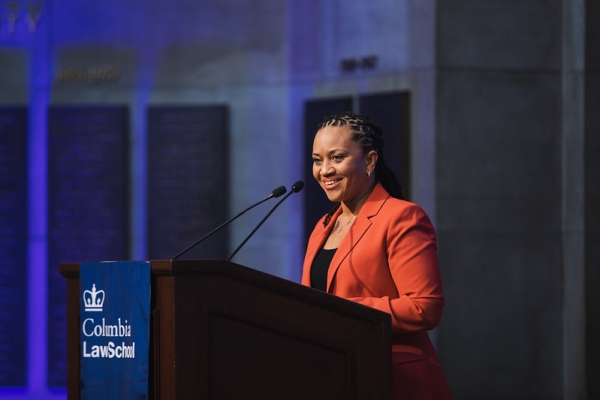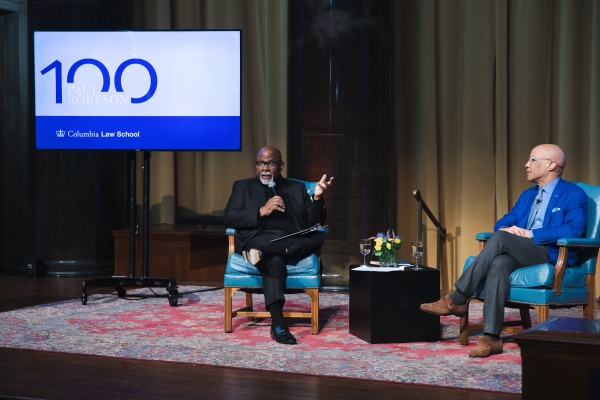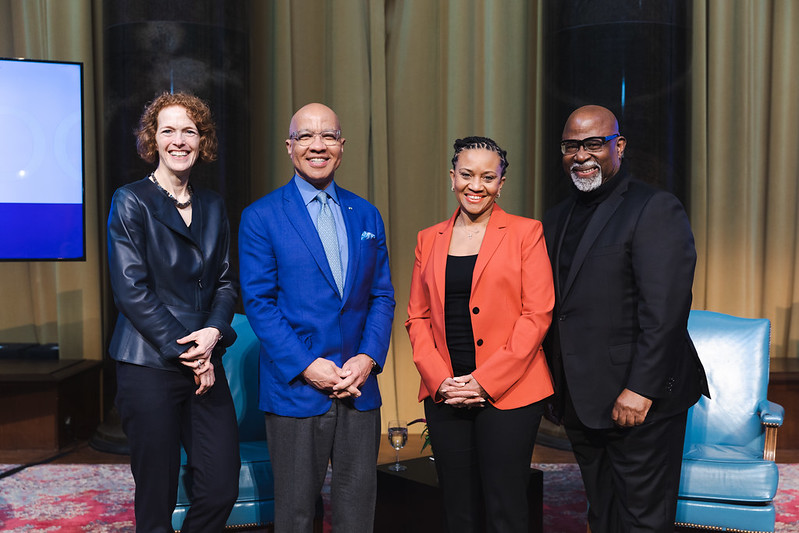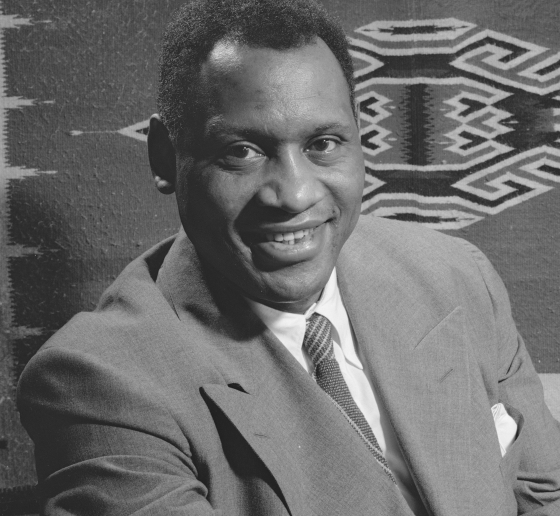2023 Paul Robeson Lecture and 8th Annual Alumni of Color Reception
Professor Kendall Thomas and Ford Foundation President Darren Walker discuss the future of the American idea.
Beneath the soaring dome of Low Memorial Library, Columbia Law School hosted alumni, faculty, students, and other guests on March 9 for two annual events: the Paul Robeson Lecture and Alumni of Color Reception. Part of a yearlong centennial celebration of Robeson’s graduation from the Law School, this year’s program featured a forthright and often emotional fireside chat on “The Future of the American Idea” between Kendall Thomas, Nash Professor of Law, and Darren Walker, president of the Ford Foundation, one of the world’s largest philanthropic organizations. (Watch the full discussion above.)
In her opening remarks, Gillian Lester, Dean and Lucy G. Moses Professor of Law, offered a précis on Robeson’s “robust and complex” life as an advocate, athlete, performer, and cultural icon. “His life reminds us that advocacy for change requires operating from a place of both hope and grit, an abiding belief, as he had, that pushing our nation and its institutions to live up to their highest ideals is a cause, a hard cause, but a cause worthy of us all,” Dean Lester said.
The keynote speakers were introduced by their mutual friend, Sheena Wright CC ’90, LAW ’94, the first Black woman to serve as the first deputy mayor of New York City, who was previously president and CEO of the United Way of New York City from 2012 to 2022. (Wright followed in Walker’s footsteps at the Abyssinian Development Corporation, where he was the COO from 1993 to 2001, and she was president and CEO from 2002 to 2012.) In her remarks, Wright said that when she was a student at the Law School, Thomas was a mentor to her and her Black classmates. “We felt close to him. We connected to him,” she said. “As I was walking in today, someone said, ‘Do you know Darren? Do you know Kendall?’ I said, ‘Do I know them? These are my people.’”
Wright reflected on the American idea as set out 250 years ago in the Declaration of Independence (“We hold these truths to be self-evident, that all men are created equal . . .”) and how it did not apply to Black Americans whose “ancestors lived through the American reality of oppression, of choking off opportunity,” she said. At Columbia Law School, she continued, “Paul Robeson obviously paved the way for all of us.”
Power and Responsibility
Thomas opened his conversation with Walker by reading the Gwendolyn Brooks poem “Paul Robeson,” which concludes, “we are each other’s/business:/we are each other’s/magnitude and bond.” Describing Walker as one of the most important change-makers and thought leaders in the United States, Thomas said, “I can think of no better person to help us to celebrate this year of Paul Robeson.”
Like Robeson, Walker has not followed a traditional legal career path, but he has used his law school education as the foundation for a career in multiple arenas—Big Law, investment banking, community development, and philanthropy. “It wasn’t an education preparing me to be a public intellectual or a nonprofit executive or to be a banker, but it did give me a sense of how power is exerted by one single profession that is omnipotent in our society and economy,” Walker said. “I was interested in the question of how power works in American democracy. It was something Paul Robeson was interested in, and he mastered using his legal education [and] transcending it.”
Thomas asked Walker what he’d like students to know about the role and obligations of African American lawyers, especially those who are the descendants of enslaved people. “This question of what are the special responsibilities of African American graduates is a complicated one in ways that it is not for their white peers,” Walker said. While it is necessary that African American lawyers pursue careers in public interest and public service, he said, it is just as essential that they take on leadership roles in the private sector.
“We need people in places of power,” said Walker. “Because the interaction between the deployment of capital and who gets justice is real.”
Walker emphasized that it’s as important to honor and support Black lawyers who are social justice leaders as those who take another path. “I also want to have it in our minds that we see that Black woman who is a partner at Cravath Swaine & Moore and that we support them, and we have a mindset that rewards and recognizes the choices that they have made, which are often in environments that are more hostile than working at the LDF or for a public interest law firm.”
Walker also shared his perspective on charitable giving and the role of nonprofits, which is the subject of his book From Generosity to Justice: A New Gospel of Wealth. “Philanthropy is commendable, but it should not allow the philanthropist to overlook the economic injustice which makes philanthropy necessary,” he said, paraphrasing Martin Luther King Jr. “What [King] laid out was an idea that I write about, which is about moving from this notion of philanthropy as charity, as generosity, to dignity and justice. . . . It requires the philanthropist to interrogate their culpability and complicity in the very problems they’re trying to solve.”
Advancing the American Idea
The issue that is fundamental to realizing the American idea, Walker said, is voting rights; the ways that Black Americans have been prohibited, prevented, or discouraged from voting directly contradict that idea. “It’s important to remember that we were not a democracy in this country until the passage of the Voting Rights Act,” he said. “This idea of voting is so essential to your identity as a citizen of this country. What patriot would seek to undermine anyone seeking to advance that right to all Americans?”
Thomas posed a final set of questions to Walker about how universities, law schools, and their students can advance the American idea. He quoted from Walker’s 2022 essay published in The New York Times, “The Founders Bequeathed Us Something Radical,” in which Walker proclaims his “unwavering” love for America and that the American idea is one worth improving but also expresses his fear that Americans “are mired in a culture of absolutism and tearing ourselves apart at the seams.”
Walker responded by beseeching law school students to engage in civic life and civil conversation: He called for “people of goodwill” to remain in the public square as an antidote to toxic discourse. He decried the “massive issue of ‘motive misattribution’ in the square, where if you say something to me as a Black queer man that I disagree with, or I don’t believe to be true, my response is, ‘You’re a homophobe, and you’re a racist,’” he said. Such presumptions, he continued, are counterproductive “if we want the square to be vibrant and to be what it needs to be in order for this democracy to work and for the American idea to be realized.”
Following the lecture, guests enjoyed the annual Alumni of Color reception in Low Library (photos included in the gallery below).



